雅思逆袭口语必看
- 格式:docx
- 大小:12.06 KB
- 文档页数:1
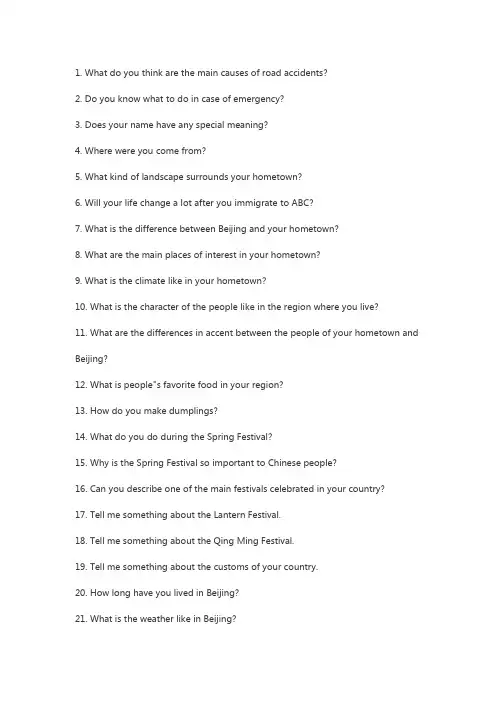
1. What do you think are the main causes of road accidents?2. Do you know what to do in case of emergency?3. Does your name have any special meaning?4. Where were you come from?5. What kind of landscape surrounds your hometown?6. Will your life change a lot after you immigrate to ABC?7. What is the difference between Beijing and your hometown?8. What are the main places of interest in your hometown?9. What is the climate like in your hometown?10. What is the character of the people like in the region where you live?11. What are the differences in accent between the people of your hometown and Beijing?12. What is people"s favorite food in your region?13. How do you make dumplings?14. What do you do during the Spring Festival?15. Why is the Spring Festival so important to Chinese people?16. Can you describe one of the main festivals celebrated in your country?17. Tell me something about the Lantern Festival.18. Tell me something about the Qing Ming Festival.19. Tell me something about the customs of your country.20. How long have you lived in Beijing?21. What is the weather like in Beijing?22. How do you compare the climate in Beijing with that in your hometown?23. What place in Beijing do you like best? Why ?24. Which is the worst place you"ve been to China?25. Which is the best place you"ve been to China?26. What places in Beijing should a foreigner visit? Why?27. What are the major social problems in Beijing? How can they be solved?28. What is the biggest problem China faces?29. What places in Beijing should a foreigner visit? Why?30. Could you tell me something about your family?31. Have you any children?32. What is your child"s name? Does his name have a meaning?33. What does your wife/husband do?34. When did you get married?35. Describe your wedding.36. How have weddings changed in recent years?37. Are there any special customs about wedding in your region?38. Describe a traditional wedding ceremony.39. Where did you go for your honeymoon?40. Did you have to ask for permission from your parents before you got married?41. Is it acceptable for couples to live together without marrying?42. Where do you think a newly couple should live? Living with their parents or on their own?43. What responsibilities should a couple take?44. How do Chinese usually celebrate birthdays?45. Are there any traditions concerning the birth of a baby?46. What kind of parent do you intend to be?47. What do you think of One-Child Policy in China?48. Why do people in China traditionally want to have a son?49. What difficulties do Chinese farmers have concerning their old age?50. What do you think needs to be done in order to relieve the farmer"s worries?51. What hope or fears do you have for your children?52. What sort of culture do you hope your child will grow up in?53. Are you going to bring up your child differently from the way you were brought up? How?54. Do you enjoy shopping?55. Who does most of the shopping in your family?56. What are you good at cooking? What is your favorite dish?57. Who does most of cooking in your family?58. Is there *** discrimination in China?59. How do you sum up women"s conditions in China?60. What are the causes of *** discrimination?61. Should government pay certain salaries to those housewives? Why or why not?62. Would you want your wife to continue with her career or to stay at home taking care of the household after you get married?63. Have you ever wished to be one of the opposite ***? Why (why not)?64. What would you do if your next-door neighbour were noisy nearly all the time?65. Do you have a lot of friend?66. What does friendship mean to you? What kind of people do you make friend with?67. What is your major?68. How do you like your major?69. When and where did you graduate? What qualifications have you obtained?70. Do you still remember your school days?71. What impressed you most when you were at university?72. Which is the best university in your country?73. Could you sum up your own study habits in a few points?74. What do you think of the practice of setting up key schools in primary and secondary school education in China?75. Do you think the subjects you are studying today are relevant to present-day society? Why ?76. What do you think education should be? Should it be a process of learning what is useful for your future life or should it be simply learning for enjoyment? Why?77. What do you do for a living?78. What do you do in the office every day?79. Since your job seems too professional to me, could you explain it in detail?80. What are your job prospects?81. If you had the opportunity to change your job, what would you do with it?82. Do you have any ambitious?83. Will any possible future changes affect your job in any way?84. What are your spare time interests?85. How do you spend your weekends?86. What is your favorite sport? What are the rules?87. What is the most popular sport in your country?88. What are the sporting facilities like in your university/Beijing?89. What do you know about Qigong? Do you believe in Qigong?90. What do you do in your spare time?91. Do you often read newspapers? If not, why ones do you read?92. What do you think of computer?93. Do you think computer has changed our life so much?94. Do you often go to the cinema/theatre?95. What kind of films do you like best?96. Do you often watch TV? What is your favorite program?97. Do you think watching TV too much is a waste of time?98. What kind of music do you enjoy?99. Who is your favorite film star? Will you describe him/her to me?100. Do you enjoy travelling?101. Where have you been travelling to? Which place interested you most? 102. Do you smoking?103. Do you think smoking is a problem that needs special attention and has to be solved? If so, why?104. What do you know about ABC?105. What problem do you think you will have in ABC?106. How will you overcome the difficulties?107. Do you think you will be able to cope with English-demands of your intended study program in ABC?108. What difficulties do you think you’ll encounter in your studies in ABC? 109. Can you imagine what life in Britain/Canada/Australia/London, etc. would be like?110. How will you fare in Britain/Canada/Australia, etc. without your family? 111. What do you intend to study?112. Which university are you going to study at?113. Why did you choose this university?114. Where are you going to study in ABC?115. What are you plans in ABC?116. What is your research proposal all about?117. What do you hope for most from your study abroad?118. Will your study abroad help your job prospects after come back to China? 119. Should you study more theory or do more practice? Give your reasons, please. 120. What kind of differences in the cultures are you expecting between China and the ABC?121. How will your study in Britain benefit your work in China when you come back to China?122. How will your study in Britain benefit your work in China when you come back to China?123. What do you intend to do after you finish studying?124. What will be your main problem when you are study in a foreign country? 125. What problem can you foresee in the future when you come back to China? 126. Will there be any adjustment problems in your life when you come back to China? If so, what are they?127. Will you have to make any changes in your work/life when you come back to China?128. Do you think there will be a gap between your knowledge gained in China and the level of knowledge you are going to encounter on arrival? If so, what will it be? 129. What do you think of the future of China keeps an open policy?130. What do you regard as the most significant events in your country’s recent history?131. Are there any special places you want to see in Canada? What are they? 132. What do you especially want to do in Canada?133. How do you like your life in ABC University?134. What do you think of the training in the university?135. In what way do you think university training is helpful or falls short?136. What aspect of English do you find the most difficult?137. Do you find American English easier to understand than Britain English? 138. What sports are played in your country?139. Could you describe the traditional architecture of your country?140. What role dose religion play in everyday life in your country?141. What would you regard as the most significant events in your country"s recent history?142. How aware do you think people are nowadays about environmental issues? 143. Could you tell me why you chose to study at the university of ABC?144. What role dose tourism play in your country"s economy?145. How serious is unemployment in your country?146. In your opinion, what are the most serious problems associated with modern life?147. What do you think have been the most important changes in your field over the past 5 years?148. What are you going to major in ?149. Are you going to do your own cooking when you are at university?150. Some local students feel that overseas students get preferential treatment. What is your opinion?151. Do you think you will be able to cope with the English-language demands of your intended program?。
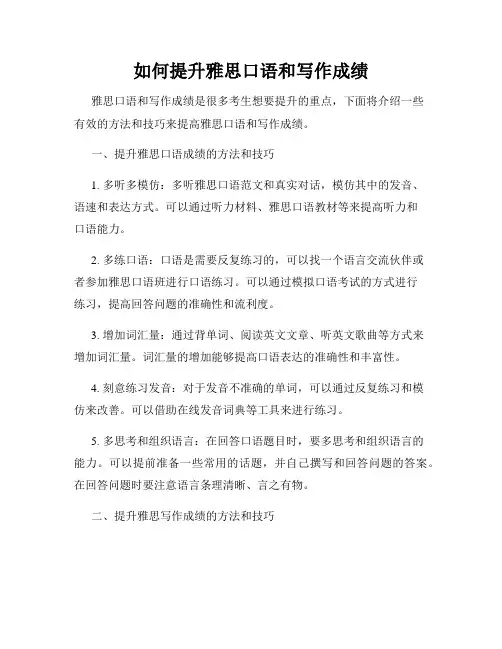
如何提升雅思口语和写作成绩雅思口语和写作成绩是很多考生想要提升的重点,下面将介绍一些有效的方法和技巧来提高雅思口语和写作成绩。
一、提升雅思口语成绩的方法和技巧1. 多听多模仿:多听雅思口语范文和真实对话,模仿其中的发音、语速和表达方式。
可以通过听力材料、雅思口语教材等来提高听力和口语能力。
2. 多练口语:口语是需要反复练习的,可以找一个语言交流伙伴或者参加雅思口语班进行口语练习。
可以通过模拟口语考试的方式进行练习,提高回答问题的准确性和流利度。
3. 增加词汇量:通过背单词、阅读英文文章、听英文歌曲等方式来增加词汇量。
词汇量的增加能够提高口语表达的准确性和丰富性。
4. 刻意练习发音:对于发音不准确的单词,可以通过反复练习和模仿来改善。
可以借助在线发音词典等工具来进行练习。
5. 多思考和组织语言:在回答口语题目时,要多思考和组织语言的能力。
可以提前准备一些常用的话题,并自己撰写和回答问题的答案。
在回答问题时要注意语言条理清晰、言之有物。
二、提升雅思写作成绩的方法和技巧1. 多练习写作:写作是需要不断练习的,可以选择一些雅思写作真题,进行写作练习。
同时,建议利用外语写作软件或找一个老师或朋友定期检查写作作文,帮助改善写作中的语法和用词错误。
2. 合理安排写作时间:在考试前的训练过程中,可以先规划好写作的时间,掌握一定的写作节奏和速度。
在考试时,要把总时间分配给写作和修改两个环节,充分利用好每一分钟。
3. 提高词汇量和语法水平:通过背单词、记忆常用短语、阅读英文文章等方式来提高词汇量。
同时,要注意复习英文语法,避免语法错误。
4. 多练习各种写作题型:雅思写作包括图表作文、观点论证、问题解决等多种题型,要针对不同的题型进行针对性的写作练习。
可以选择一些经典的范文进行参考和模仿。
5. 注意写作结构和段落划分:写作时要有清晰的结构,根据题目要求合理划分段落。
要注意开头和结尾的写法,用恰当的过渡词和连接词来使得文章结构紧密。
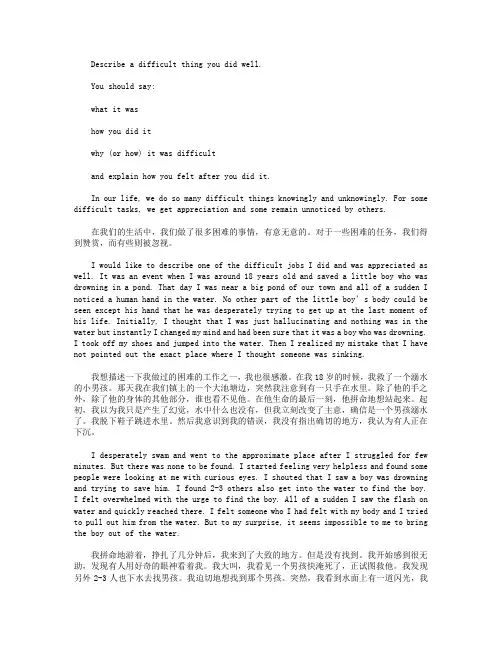
Describe a difficult thing you did well.You should say:what it washow you did itwhy (or how) it was difficultand explain how you felt after you did it.In our life, we do so many difficult things knowingly and unknowingly. For some difficult tasks, we get appreciation and some remain unnoticed by others.在我们的生活中,我们做了很多困难的事情,有意无意的。
对于一些困难的任务,我们得到赞赏,而有些则被忽视。
I would like to describe one of the difficult jobs I did and was appreciated as well. It was an event when I was around 18 years old and saved a little boy who was drowning in a pond. That day I was near a big pond of our town and all of a sudden I noticed a human hand in the water. No other part of the little boy’s body could be seen except his hand that he was desperately trying to get up at the last moment of his life. Initially, I thought that I was just hallucinating and nothing was in the water but instantly I changed my mind and had been sure that it was a boy who was drowning.I took off my shoes and jumped into the water. Then I realized my mistake that I have not pointed out the exact place where I thought someone was sinking.我想描述一下我做过的困难的工作之一,我也很感激。
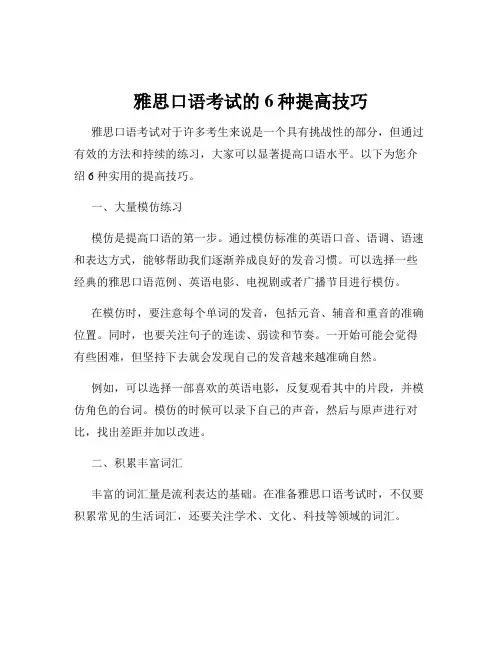
雅思口语考试的6种提高技巧雅思口语考试对于许多考生来说是一个具有挑战性的部分,但通过有效的方法和持续的练习,大家可以显著提高口语水平。
以下为您介绍 6 种实用的提高技巧。
一、大量模仿练习模仿是提高口语的第一步。
通过模仿标准的英语口音、语调、语速和表达方式,能够帮助我们逐渐养成良好的发音习惯。
可以选择一些经典的雅思口语范例、英语电影、电视剧或者广播节目进行模仿。
在模仿时,要注意每个单词的发音,包括元音、辅音和重音的准确位置。
同时,也要关注句子的连读、弱读和节奏。
一开始可能会觉得有些困难,但坚持下去就会发现自己的发音越来越准确自然。
例如,可以选择一部喜欢的英语电影,反复观看其中的片段,并模仿角色的台词。
模仿的时候可以录下自己的声音,然后与原声进行对比,找出差距并加以改进。
二、积累丰富词汇丰富的词汇量是流利表达的基础。
在准备雅思口语考试时,不仅要积累常见的生活词汇,还要关注学术、文化、科技等领域的词汇。
可以通过阅读英文报纸、杂志、书籍来扩大词汇量。
遇到不认识的单词,及时查阅词典并记录下来。
同时,要学会运用新学的词汇进行造句和练习,加深记忆和理解。
此外,使用单词卡片也是一个不错的方法。
将单词写在卡片的一面,释义和例句写在另一面,随时随地进行复习。
三、注重语法准确虽然在口语交流中,语法的要求相对宽松一些,但基本的语法错误仍然会影响我们的表达和理解。
因此,要重视语法的学习和练习。
回顾英语语法的基础知识,如时态、语态、句型结构等。
在练习口语时,注意句子的完整性和语法的正确性。
如果不确定某个句子的语法是否正确,可以请教老师或者参考语法书籍。
可以通过做一些语法练习题来巩固所学的知识,同时在日常交流中,有意识地纠正自己的语法错误。
四、培养英语思维很多考生在口语表达时,往往会先在脑海中用中文构思,然后再翻译成英文,这样容易导致表达不流畅和中式英语的出现。
要努力培养英语思维,直接用英语进行思考和表达。
可以通过日常生活中的点滴来训练,比如看到一个物品、一个场景,直接用英语描述出来。
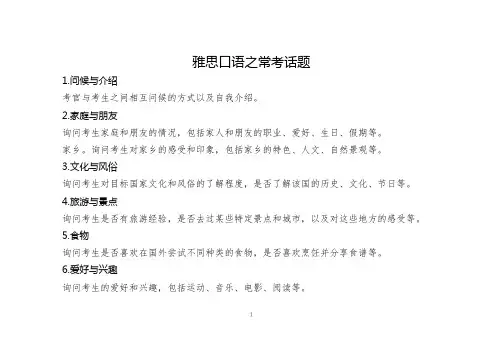
雅思口语之常考话题
1.问候与介绍
考官与考生之间相互问候的方式以及自我介绍。
2.家庭与朋友
询问考生家庭和朋友的情况,包括家人和朋友的职业、爱好、生日、假期等。
家乡。
询问考生对家乡的感受和印象,包括家乡的特色、人文、自然景观等。
3.文化与风俗
询问考生对目标国家文化和风俗的了解程度,是否了解该国的历史、文化、节日等。
4.旅游与景点
询问考生是否有旅游经验,是否去过某些特定景点和城市,以及对这些地方的感受等。
5.食物
询问考生是否喜欢在国外尝试不同种类的食物,是否喜欢烹饪并分享食谱等。
6.爱好与兴趣
询问考生的爱好和兴趣,包括运动、音乐、电影、阅读等。
1
7.语言技能
询问考生在语言技能方面的表现,包括英语水平、语法、词汇量等。
8.教育背景
询问考生的教育背景,包括所学专业、学校、成绩等。
9.工作与职业
询问考生的职业规划、工作经历等。
10.未来计划
询问考生在未来的打算,包括留学、旅游、移民等。
11.环保与可持续发展
询问考生对环保和可持续发展的看法,包括日常生活中如何实践可持续发展的措施等。
12.社会问题
询问考生对社会问题的看法,包括种族、性别、贫穷等问题。
2。
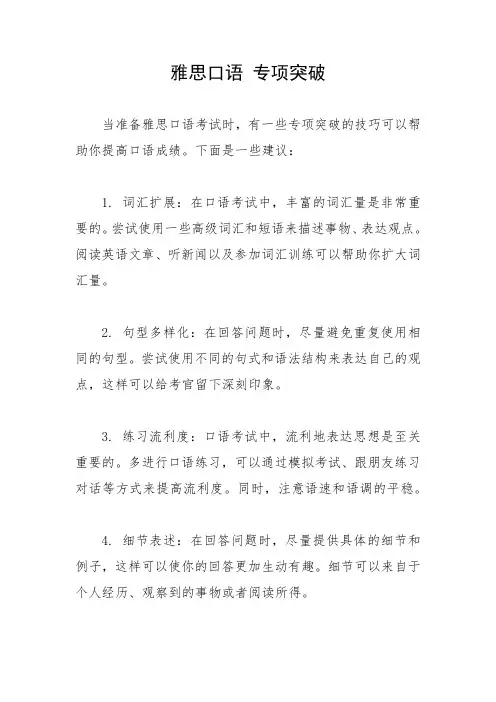
雅思口语专项突破
当准备雅思口语考试时,有一些专项突破的技巧可以帮助你提高口语成绩。
下面是一些建议:
1. 词汇扩展:在口语考试中,丰富的词汇量是非常重要的。
尝试使用一些高级词汇和短语来描述事物、表达观点。
阅读英语文章、听新闻以及参加词汇训练可以帮助你扩大词汇量。
2. 句型多样化:在回答问题时,尽量避免重复使用相同的句型。
尝试使用不同的句式和语法结构来表达自己的观点,这样可以给考官留下深刻印象。
3. 练习流利度:口语考试中,流利地表达思想是至关重要的。
多进行口语练习,可以通过模拟考试、跟朋友练习对话等方式来提高流利度。
同时,注意语速和语调的平稳。
4. 细节表述:在回答问题时,尽量提供具体的细节和例子,这样可以使你的回答更加生动有趣。
细节可以来自于个人经历、观察到的事物或者阅读所得。
5. 语法准确性:虽然在口语考试中,流畅度和表达能力较为重要,但也不能忽视语法的准确性。
尽量避免常见的语法错误,例如动词时态的混淆、主谓一致等。
6. 自信心:保持自信心对于取得好成绩非常重要。
在回答问题时,积极表达自己的观点,并且相信自己的能力。
训练和准备可以帮助你增强自信心。
通过以上的技巧和建议,你可以更好地应对雅思口语考试,提高你的口语成绩。
记住,多加练习和积极准备是取得进步的关键。
祝你成功!。
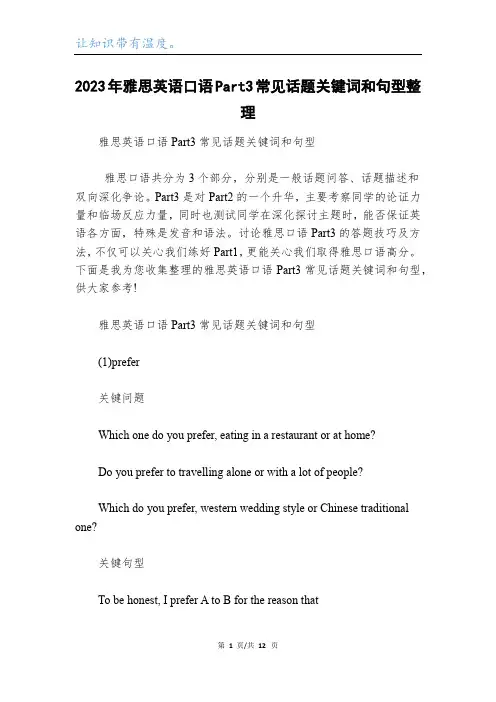
2023年雅思英语口语Part3常见话题关键词和句型整理雅思英语口语Part3常见话题关键词和句型雅思口语共分为3个部分,分别是一般话题问答、话题描述和双向深化争论。
Part3是对Part2的一个升华,主要考察同学的论证力量和临场反应力量,同时也测试同学在深化探讨主题时,能否保证英语各方面,特殊是发音和语法。
讨论雅思口语Part3的答题技巧及方法,不仅可以关心我们练好Part1,更能关心我们取得雅思口语高分。
下面是我为您收集整理的雅思英语口语Part3常见话题关键词和句型,供大家参考!雅思英语口语Part3常见话题关键词和句型(1)prefer关键问题Which one do you prefer, eating in a restaurant or at home?Do you prefer to travelling alone or with a lot of people?Which do you prefer, western wedding style or Chinese traditional one?关键句型To be honest, I prefer A to B for the reason thatIn my mind, I thinkis better, becauseTo tell you the truth, although B is, A is still better than B, because (2)benefit关键问题What are the benefits of swimming?关键句型The first benefit comes to my mind isPeople say, but for me,There are several benefits to name. Firstly, Secondly,Thirdly, (3)kind关键问题What kind of food do you like best?关键句型My favorite isIll say the one which earns my interest isMy answer would be(4)how关键问题How do you think we can control the terrible traffic condition?关键句型Before I explain, Id like you to imagine that you are a, and. Afterthis thinking, you might know how, right?There are a couple of ways to. In the first place, In addition,. Lastbut not least,This is really a big question for me. I think with the development of technology and society, the problem will be solved gradually.(5)advantages and disadvantages关键问题What are the advantages and disadvantages of watching TV program?关键句型The advantage is, while the disadvantage isOn one hand,. On the other hand,There are at least two advantages/disadvantages. For one thing,. Theother one is...(6)why关键问题Why is it important for us to give gifts to others?关键句型There are three reasons for that. To begin with,. In addition,. Lastly,.A couple of reasons may explain that. In the first place,. Whats more,. Last but not least,.There are several reasons for that. Firstly,. Secondly,.Thirdly.Well, the reasons for that are very simple. At first, .. Next,. Finally,.(7)what should people do to关键问题What should people do to minimize the damage of bad weather?关键句型We shouldThe first and foremost thing we should do isThe only way is(8)Tell me something about关键问题Tell me something about the tourism attraction which leaves you the deepest impression.关键句型If you like, I can show you around, and youll know why I like it so much.If you go there, you will receive a warm welcome.It may sound too general if I dont go into any detail.(9)difference关键问题What are the differences between Chinese food and western food?关键句型A is On the contrary,B isThere is a huge difference between A and B. A is, but B isA is. This is very different from B, which is(10)China关键问题What do Chinese people like to read?关键句型It depends. You know, China has a large population. For some people, . But othersWell, choices are divided. On one hand, A.. On the other hand, B.There is a difference in preference between A and B. While A is, B is .(11)choose关键问题Which one would you choose, living in a big city or a small countryside?关键句型I will give my support forI would vote forwill be my first choice.(12)characteristics关键问题What are the characteristics of good classmates?关键句型I think and may be the words to describe it.There are many characteristics. But the most distinctive one is关键问题Tell me something about the tourism attraction which leaves you the deepest impression.关键句型If you like, I can show you around, and youll know why I like it so much.If you go there, you will receive a warm welcome.It may sound too general if I dont go into any detail.(13)effect关键问题What are the effects of bad weather?关键句型It is helpful forIt is beneficial especially whenIt is harmful to(14)what do you think about关键问题What do you think about the life of the famous people?关键句型When I first think about, the first thing come to my mind is (15)would you like关键问题Would you like to be a singer?Would you like to be a movie star?Would you like to be a famous person?关键句型If I have the time, I would like to have a try, because I think it would be interesting and meaningful.I afraid no, because I dont care too much about.Absolutely. It is my childhood dream comes true.(16)do you often关键问题Do you often read books?Do you often go to restaurant?Do you often go to cinema?关键句型Yes. And I whenever I am free.No. I used to do that before, but now I drop it.No, because I dont have enough time to do that.以上,大致总结了雅思口语Part3可能考到的一些问题,盼望能关心广阔考生发觉雅思口语Part3的出题规律,并一一攻克其中的重点和难点。
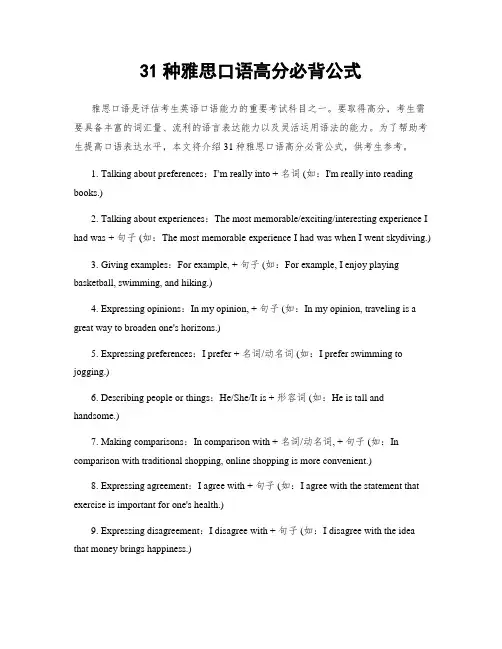
31种雅思口语高分必背公式雅思口语是评估考生英语口语能力的重要考试科目之一。
要取得高分,考生需要具备丰富的词汇量、流利的语言表达能力以及灵活运用语法的能力。
为了帮助考生提高口语表达水平,本文将介绍31种雅思口语高分必背公式,供考生参考。
1. Talking about preferences:I’m really into + 名词 (如:I'm really into reading books.)2. Talking about experiences:The most memorable/exciting/interesting experience I had was + 句子 (如:The most memorable experience I had was when I went skydiving.)3. Giving examples:For example, + 句子 (如:For example, I enjoy playing basketball, swimming, and hiking.)4. Expressing opinions:In my opinion, + 句子 (如:In my opinion, traveling is a great way to broaden one's horizons.)5. Expressing preferences:I prefer + 名词/动名词 (如:I prefer swimming to jogging.)6. Describing people or things:He/She/It is + 形容词 (如:He is tall and handsome.)7. Making comparisons:In comparison with + 名词/动名词, + 句子 (如:In comparison with traditional shopping, online shopping is more convenient.)8. Expressing agreement:I agree with + 句子 (如:I agree with the statement that exercise is important for one's health.)9. Expressing disagreement:I disagree with + 句子 (如:I disagree with the idea that money brings happiness.)10. Describing changes:There has been a significant + 形容词/noun (如:There has been a significant increase in the number of people using smartphones.)11. Giving reasons:The reason why + 句子 is that + 原因 (如:The reason why I chose to study abroad is that I want to experience different cultures.)12. Describing trends:There has been a steady/increasing/decreasing + 名词 (如:There has been a steady rise in global temperatures.)13. Talking about advantages:One of the advantages of + 名词/动名词 is that + 句子 (如:One of the advantages of living in a big city is that there are more job opportunities.)14. Talking about disadvantages:One of the disadvantages of + 名词/动名词 is that + 句子 (如:One of the disadvantages of living in a big city is the high cost of living.)15. Expressing likelihood:It is likely/probable that + 句子 (如:It is likely that he will pass the exam.)16. Expressing certainty:I am certain/sure/confident that + 句子 (如:I am confident that I will achieve my goals.)17. Giving suggestions:I would suggest/recommend + 动名词/动词原形 (如:I would suggest taking a break and relaxing.)18. Expressing regrets:I regret + 动名词/动词-ing (如:I regret not studying harder for the exam.)19. Giving instructions:First, + 句子. Then, + 句子 (如:First, wash the vegetables. Then, cut them into small pieces.)20. Expressing importance:It is important/crucial/vital to + 动词原形 (如:It is important to maintain a healthy lifestyle.)21. Expressing consequences:If + 句子, + 结果 (如:If you don't study, you will fail the exam.)22. Expressing purpose:The purpose of + 名词/动名词 is to + 动词原形 (如:The purpose of education is to equip students with knowledge and skills.)23. Expressing condition:If + 句子, + 句子 (如:If it rains, we will stay indoors.)24. Expressing possibilities:There is a possibility/chance that + 句子 (如:There isa possibility that he will be promoted.)25. Expressing alternatives:Instead of + 动名词/动词-ing, + 句子 (如:Instead of driving, I prefer cycling to work.)26. Expressing reasons:The reason for + 名词/动名词 is that + 句子 (如:The reason for the traffic jam is that there is construction on the road.)27. Expressing consequences:As a result of + 名词/动名词, + 句子 (如:As a result of the pandemic, many people lost their jobs.)28. Expressing possibilities:It is possible/probable that + 句子 (如:It is possible that she will arrive late.)29. Giving examples:Take + 名词/动名词 for example (如:Take environmental pollution for example.)30. Expressing time:In + 一段时间, + 句子 (如:In recent years, people have become more aware of the importance of environmental protection.)31. Expressing contrast:On the one hand, + 句子. On the other hand, + 句子 (如:On the one hand, technology has made our lives more convenient. On the other hand, it has also led to reliance and decreased interpersonal connections.)通过学习和熟练运用这些雅思口语高分必背公式,考生将能够在口语表达中更加流利地使用适当的词汇和句子结构,从而获得更高的口语分数。
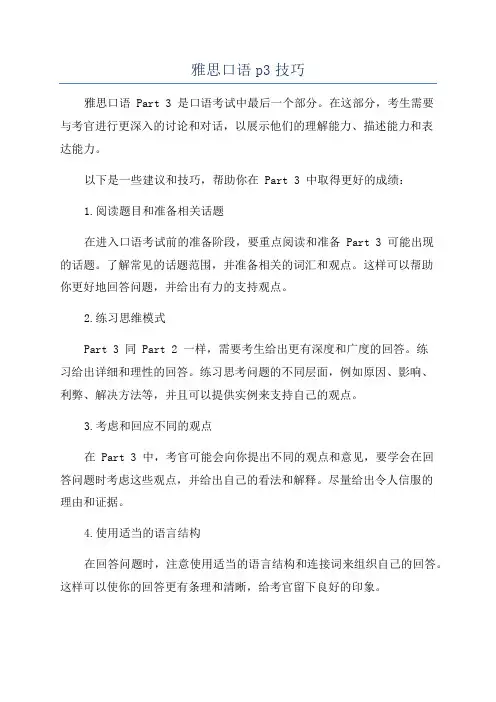
雅思口语p3技巧雅思口语 Part 3 是口语考试中最后一个部分。
在这部分,考生需要与考官进行更深入的讨论和对话,以展示他们的理解能力、描述能力和表达能力。
以下是一些建议和技巧,帮助你在 Part 3 中取得更好的成绩:1.阅读题目和准备相关话题在进入口语考试前的准备阶段,要重点阅读和准备 Part 3 可能出现的话题。
了解常见的话题范围,并准备相关的词汇和观点。
这样可以帮助你更好地回答问题,并给出有力的支持观点。
2.练习思维模式Part 3 同 Part 2 一样,需要考生给出更有深度和广度的回答。
练习给出详细和理性的回答。
练习思考问题的不同层面,例如原因、影响、利弊、解决方法等,并且可以提供实例来支持自己的观点。
3.考虑和回应不同的观点在 Part 3 中,考官可能会向你提出不同的观点和意见,要学会在回答问题时考虑这些观点,并给出自己的看法和解释。
尽量给出令人信服的理由和证据。
4.使用适当的语言结构在回答问题时,注意使用适当的语言结构和连接词来组织自己的回答。
这样可以使你的回答更有条理和清晰,给考官留下良好的印象。
例如,使用一些表示原因的结构,例如"因为","由于","由"等,可以让你的回答更加具体和清晰。
5.练习流利和自然的语音和语调在 Part 3 中,流利和自然的语音和语调非常重要。
要尽量避免直接背诵答案,而是用自己的话来表达观点。
练习时,可以录音并重听自己的回答,找出自己可能存在的问题,并进行改进。
6.回答问题时不要太长或太短尽量避免回答问题时太长或太短。
太长的回答可能导致你在回答过程中迷失方向,并且浪费时间。
太短的回答则可能使考官觉得你没有充分理解问题,或者不够有深度。
要尽量给出具体和有深度的回答,同时注意时间的把握。
8.不要回避问题如果考官向你提出一个敏感或尴尬的问题,不要回避或者拒绝回答。
相反,要尝试选择一个合适的角度,并给出你自己的观点和解释。
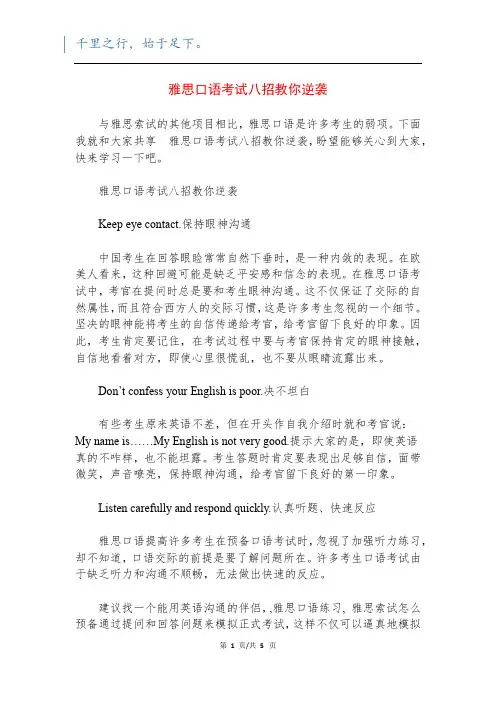
雅思口语考试八招教你逆袭与雅思索试的其他项目相比,雅思口语是许多考生的弱项。
下面我就和大家共享雅思口语考试八招教你逆袭,盼望能够关心到大家,快来学习一下吧。
雅思口语考试八招教你逆袭Keep eye contact.保持眼神沟通中国考生在回答眼睑常常自然下垂时,是一种内敛的表现。
在欧美人看来,这种回避可能是缺乏平安感和信念的表现。
在雅思口语考试中,考官在提问时总是要和考生眼神沟通。
这不仅保证了交际的自然属性,而且符合西方人的交际习惯,这是许多考生忽视的一个细节。
坚决的眼神能将考生的自信传递给考官,给考官留下良好的印象。
因此,考生肯定要记住,在考试过程中要与考官保持肯定的眼神接触,自信地看着对方,即使心里很慌乱,也不要从眼睛流露出来。
Don’t confess your English is poor.决不坦白有些考生原来英语不差,但在开头作自我介绍时就和考官说:My name is……My English is not very good.提示大家的是,即使英语真的不咋样,也不能坦露。
考生答题时肯定要表现出足够自信,面带微笑,声音嘹亮,保持眼神沟通,给考官留下良好的第一印象。
Listen carefully and respond quickly.认真听题、快速反应雅思口语提高许多考生在预备口语考试时,忽视了加强听力练习,却不知道,口语交际的前提是要了解问题所在。
许多考生口语考试由于缺乏听力和沟通不顺畅,无法做出快速的反应。
建议找一个能用英语沟通的伴侣,,雅思口语练习, 雅思索试怎么预备通过提问和回答问题来模拟正式考试,这样不仅可以逼真地模拟考试场景,还可以熬炼听力和反应力量,还可以培育眼神沟通的习惯。
Don’t pretend you understand the questions when you don’t.不行不懂装懂有些考生考试时由于紧急或听力不好没听清考官的问题,但又不想暴露,于是便连蒙带猜给出一个答案。
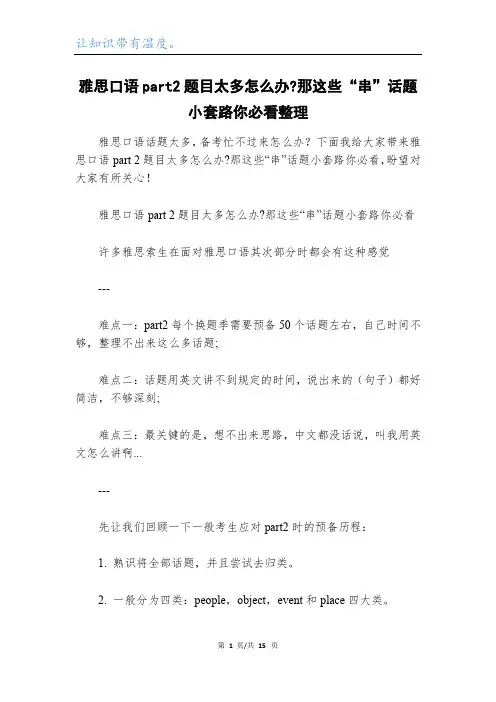
雅思口语part2题目太多怎么办?那这些“串”话题小套路你必看整理雅思口语话题太多,备考忙不过来怎么办?下面我给大家带来雅思口语part 2题目太多怎么办?那这些“串”话题小套路你必看,盼望对大家有所关心!雅思口语part 2题目太多怎么办?那这些“串”话题小套路你必看许多雅思索生在面对雅思口语其次部分时都会有这种感觉---难点一:part2每个换题季需要预备50个话题左右,自己时间不够,整理不出来这么多话题;难点二:话题用英文讲不到规定的时间,说出来的(句子)都好简洁,不够深刻;难点三:最关键的是,想不出来思路,中文都没话说,叫我用英文怎么讲啊...---先让我们回顾一下一般考生应对part2时的预备历程:1. 熟识将全部话题,并且尝试去归类。
2. 一般分为四类:people,object,event和place四大类。
3. 每一类去搜寻一些模版(文章),自己改的更简洁,易背或者加工二次创作。
4. 在背诵中遗忘,在遗忘中回忆,在回忆中卡壳...每一种(方法)都有它的科学性,但大部分的考生其实并没有这么有急躁去这么备考。
甚至许多考生面对50多个话题时,就很佛系了,心中悄悄想但愿我不要抽到这个话题,不要抽到那个话题...为了增加考生的备考效率以及在相对较短的时间内复习到更多的part2话题菌菌对比了最近几个季度的口语考题,用一个易懂好记的话题思路“串”起来尽可能多的话题。
“串”话题要靠大胆且合理的脑洞。
下面我们就以话题Describe an activity you do to stay healthy为例来进行讲解:开头思路:什么活动可以保持健康呢?我选择去健身房吧,这个够健康!主体段思路(万能思路):一. Diet control1. More vegetables and fruits: exemplify(举例) and explain(举例)-比如:broccoli, banana, apples2. less high-calories junk food and sweet food: exemplify(举例)and explain(举例)-比如:, coke, french fries3. Advantages of diet control: 可以从body shape,掌握体重以及削减得病的风险来谈。
三个雅思口语part2万能开头让考官对你刮目相看很多考生会在备考时背诵很多口语模板,但是一旦考试时遇到原题你完全按照背诵的模板来回答,反而不一定能得到比较好的分数。
一方面,考官一听就知道你是不是背的,有些考官会不喜欢背诵的模板;另一方面,背出来的文章明显带有书面的感觉,跟口头表达是比较不一样的。
因此,雅思口语的模板大家可以背诵,比如有一些句子确是很好的套句,既能帮你赢得思考时间,又不显得很刻板;但是考试时一定要灵活,巧妙地利用才能帮助你取得高分,这里给大家推荐一些雅思口语part2万能开头。
三个雅思口语part2万能开头让考官对你刮目相看一、提到考官,使之与话题联系在一起在谈到“Describe a hobby you have”这一话题时,一位考生是这样开场的:Today I am going to talk about collecting postcards—a hobby that is both fascinating and financially rewarding. I would like to explain the basic kinds of collectible postcards, why they are so valuable, and how collectors buy and sell their cards.而另一位考生则给出了不一样的开场白:It’s Saturday mor ning,and you are helping clean out your grandmother’s house.After working a while,you stumble upon a trunk,open it,and discover hundreds of old postcards.Thinking about getting to your driving lesson on time, you start tossing the cards into the trash can.Congratulations!You have just thrown away a year’s tuition.对比之后,我们很快就发现,第二位考生的开场白效果比第一位考生的开场白好,因为它很好地将考官融入进来,抓住了考官的兴趣点,使之后主干部分的陈述更为顺利。
雅思口语备考攻略:提高口语能力的有效方法雅思口语备考攻略:提高口语能力的有效方法随着全球化和国际化的趋势,雅思考试成了许多人实现学业和职业规划的必备证明。
在雅思考试中,口语部分是最为重要和难度最大的一个环节。
要想获得高分,不仅需要丰富的语言知识和词汇积累,也需要掌握一些有效的口语技巧,同时保持自信和流利的表达能力。
本文将提供一些2023年有效的雅思口语备考攻略,帮助大家提高口语能力,轻松迎接雅思考试的挑战。
1. 建立正确的学习态度学习口语需要付出大量的时间和努力。
保持正确的学习态度可以帮助我们更好地应对挑战。
首先,确定自己的学习目标。
在雅思考试中,我们需要根据不同的评分标准来制定相应的目标。
其次,制定合适的学习计划。
根据自己的时间和实际情况,安排每天的学习任务,逐步提高自己的口语能力。
此外,多用英语交流、多听、多读、多背,建立起良好的英语学习习惯也是非常重要的。
2. 提高发音及语调正确的发音和语调是口语表达的重要因素。
在日常的学习中,我们要有意识地练习发音、语调和语音节奏。
可以通过听力训练、模仿名师或在语音课上学习这些技巧。
尤其是元音和辅音的发音,要特别注意准确性和清晰度。
可多借助一些语音练习软件,如Yoruba,TalkEnglish等,逐步提高自己的语音表达能力。
3.广泛积累词汇丰富的词汇积累也是一项自我提高的重要要素。
可以通过多读书、多看电影、多听广播和讨论会等进行词汇积累。
可以将生活常用词、学术词汇以及相关话题的词汇进行分类,掌握一定量的常用词汇和表达方式,同时也可以更快地理解音频材料和实现流利的表达。
4. 学习演讲技巧在雅思考试中,很多题目是与生活密切相关的话题,如“describe a family event”等。
学习一些演讲技巧可以帮助我们更好地准备这些口语表达话题。
可以通过参加演讲课程、观看优秀演讲者的视频和在社交媒体上与其他学习者进行交流等途径,提高我们的演讲技能和思维表达能力。
1.提高雅思口语的五大方法1、如果你听不到自己的发音问题,要纠正就很难了。
试着把你将的话录下来并和英语为母语人士将的对比一下。
应对雅思口语非常有效。
2、很多英语学习者常说语速太快容易养成他们的坏习惯。
由于太快而模糊不清是口语考试的大忌。
所以我们要accuracy然后才是fluency,每天操练一些基本语言以单音节开始,然后单词,把几个词连在一起,组成句子。
这样你就能慢慢开始表达自己的思想了。
3、闭上你的眼睛并在说出口之前想一想怎样发这个音。
想象出口型和脸部动作,这个可以配合看电影来做。
4、发音是个形体动作。
要学会嘴巴的发声方法和移动肌肉的方式。
每天集中训练几个音。
你发this,thank,they,和little,wool等单词困难吗?试试发th,将你的舌头放在齿间(不要咬住)并从口中吐气。
感受气流从你的舌间吹过。
5、站在镜子前查看当你发某些固定音时的嘴型,唇型和舌头的位置。
和你看到的的发音对比,平时还可以把自己的发音模样录成video,仔细观察比较。
2.雅思口语part2的黄金50秒很多考生对这段准备时间有所轻视,要么因为自己抽到的话题恰好准备过了,所以觉得这一分钟可有可无;要么自己抽到了压根没有准备过的话题,一时间慌了神。
再加上不知怎样做笔记,一分钟很快就过去了。
事实上,但凡考过雅思的同学都非常明白Part2准备时间的重要性,无论你是否在考前准备过抽到的题目,都应该在这段时间里认真思考怎样去组织要讲的话题,并通过手中的铅笔和稿纸让自己的回答更有把握。
虽然Part2准备时间规定为1分钟,但多数考官不会等那么久。
1—15秒:审清题目,拟定内容当你拿到话题卡后,迅速浏览最上面的标题,千万不要错看或漏看任何一个单词。
由于考生在考前都有大量准备,许多口语话题在脑海中已经形成惯性。
除了仔细看清楚题目,下面的提示点也要迅速浏览一遍,并利用提示点组织思路和思考自己接下来要说的内容。
因为时间有限,口语的笔记能够建立在卡片上4点提纲的基础上。
如何提升雅思口语和写作成绩雅思口语和写作是考生在雅思考试中需要备考的重要部分,对于很多考生来说,如何提升雅思口语和写作成绩是一个非常关键的问题。
本文将探讨一些方法和技巧,帮助考生提高雅思口语和写作成绩。
提升雅思口语成绩的方法和技巧1. 阅读大量英语材料:阅读是提高语言水平的有效途径之一。
通过大量阅读英语文章、报纸、杂志、小说等,可以增加词汇量,培养语感和提高口语表达能力。
同时,阅读中可以接触到不同的文章风格和写作方式,对提升写作能力也有帮助。
2. 刻意练习口语:通过模拟考试环境,进行口语练习,可以帮助考生熟悉考试流程和形式,增强自信心。
可以找一个合适的语言伙伴,进行模拟对话练习,并注意语速、语调和语法等细节。
此外,还可以通过听磁带、广播或者看英文电影、纪录片等提高对口语的理解和掌握。
3. 多听多说:多听多说是提高口语能力的重要途径。
通过多听英语材料,如英语广播、音乐、有声书等,有助于提高听力理解和语音语调能力。
在日常生活中,也要尽量多用英语交流,与外教、留学生或者其他英语学习者进行口语练习,提高口语流利度。
4. 注重词汇积累:词汇量对于提升口语表达能力至关重要。
考生可以通过背单词、记忆词组和短语、积累同义词等方式进行词汇积累。
同时,要注意学习词汇的时候要了解其正确的用法和搭配,避免使用词汇错误。
提升雅思写作成绩的方法和技巧1. 阅读范文:通过阅读高质量的雅思写作范文,可以帮助考生了解写作的结构和表达方式,提升写作能力。
可以参考一些经典的写作指南书籍,了解不同类型题目的写作模式和技巧。
2. 练习写作:写作是需要不断练习的过程。
考生可以选择一些雅思写作话题,进行限时写作练习。
在练习的过程中,要注重语法、词汇的准确性,同时也要注意结构的合理性和连贯性。
还可以请教英语老师或者其他擅长写作的人士,进行修改和指导。
3. 理清思路:在写作之前,要先理清思路,明确要表达的观点和论据。
可以使用思维导图等工具,帮助整理思绪,将观点和论证逻辑进行清晰的组织。
雅思口语话题话术与词汇推荐雅思(IELTS)口语考试是国际英语语言测试体系中的一项重要考试,作为考生在国际交流中展示口语能力的重要方式之一,备考雅思口语非常关键。
在此,本文将为大家提供一些备考雅思口语的话术和词汇推荐。
一、自我介绍话术及词汇推荐1. 开场白:Good morning/afternoon, my name is [Your Name]. I am from [Your Country] and I am [Your Age] years old. I am currently studying/working as [Your Occupation].2. 个人信息:In terms of my hobbies, I enjoy [Your Hobby], which allows me to [Reason]. Additionally, I am quite interested in [Your Interest] as it helps me [Reason].3. 家庭背景:In terms of my family, I come from a [Your Family Background], with [Number of Family Members]. I have [Number of Siblings] siblings, which makes my family a lively and supportive one.4. 学习或工作经历:I have been studying/working in the field of [Your Field] for [Number of Years] years. I find this field quite intriguing and I am passionate about [Reason].5. 未来计划:In the future, I plan to [Your Future Plan] as it aligns with my goals and allows me to [Reason]. I am excited about the possibilities that lie ahead and look forward to the challenges.二、谈论观点话术及词汇推荐1. 表达同意:I totally agree with you.I couldn't agree more.I'm in complete agreement with what you just said.2. 表达不同意:I have a slightly different opinion.I see where you're coming from, but I think differently.I'm afraid I can't agree with that.3. 表达犹豫:Well, I'm not quite sure about that.I'm a bit on the fence about this topic.I'm torn between two perspectives on this.4. 表达喜好:Personally, I am a big fan of [Your Preference].I have a strong preference for [Your Preference].I am particularly fond of [Your Preference].5. 表达原因:The reason I believe this is because...One of the main reasons for this is...This is due to the fact that...三、谈论经验话术及词汇推荐1. 举例说明:For example, when I was in [Specific Situation], I encountered [Specific Experience]. This taught me the importance of [Important Lesson].Another instance is [Another Specific Experience], where I learned [Another Important Lesson].2. 描述感受:I was deeply moved by this experience.I felt a great sense of accomplishment.It was a truly unforgettable moment.3. 表达建议:If I were to give advice, I would suggest [Your Suggestion].I highly recommend [Your Recommendation].It might be worth considering [Your Alternative].4. 表达困难或挑战:One of the challenges I faced was [Specific Challenge].I found it quite difficult to [Specific Difficulty].Overcoming this obstacle was not easy, but it was definitely worth it.5. 展望未来:In the future, I hope to continue [Your Ambition].I am determined to overcome any hurdles that come my way.I am confident that this experience has prepared me for future challenges.通过以上的话术和词汇推荐,希望能帮助大家在雅思口语考试中更好地表达自己的观点,谈论自己的经历,并且展现出良好的语言能力。
雅思口语备考拿高分的几大技巧雅思口语是雅思考试的重点和难点。
由于是采用一对一的真人对话形式,我们在实际的考场上不仅需要一些英语方面的技巧,也需要一些对话交流方面的技巧。
这篇文章就将雅思口语在备考时的技巧和考场上的技巧都汇总了一下。
大家好好看一下吧~技巧一:提前准备适合自己的口语高分词汇在备考的时候,准备一些常用的7分雅思词汇和雅思技巧,在适当的时候脱口而出,会给你的考试增光添色,同时要在考前的练习过程中,掌握好paraphrase的方法,因为在雅思考试的过程中,由于紧张或者是本身词汇的匮乏,在自己不会的单词上面会卡壳,而雅思口语是相对比较灵活的,在这种情况下,需要我们用其他的话去替代那个卡壳的点,这样你的雅思口语就会顺畅、自然。
技巧二:灵活应对雅思口语考试中的话题雅思考试中的话题有很多,疑难话题是大家拿到雅思口语满分的最大障碍,当你在雅思考试的时候,遇到的题目是从来没有见过的,或者是自己比较生疏的话题,需要你灵活转换,但是当你无法做到灵活转化的时候,那就需要说一个最容易而且最能说出内容的话题。
技巧三:充分利用考试中笔记记录雅思口语考试中的一张纸,就是第二部分开始的时候,考官会给你一张纸和一支笔,让你在思考的时候可以做一些笔记,有些考生觉得做笔记没什么意义,因为做完了之后,说的时候还是和笔记大相径庭,这说明考生在下面练习的时候没有很好的掌握通过看笔记说英语的习惯,因此在考场上才会觉得笔记没太大作用。
技巧四:调节心理状态,不畏惧,不胆怯雅思考试注重的是语言的应用性,因此在考场中的状态和心态对你的考试起到了举足轻重的作用,大部分的考生都没有参加过这样的口语考试,因此在考前对考试存在一种惧怕感,总是担心自己见到老外之后,可能会说的都会变成不会说的,这就是一种考试障碍,所以需要大家把自己的心态放平稳,一定要把雅思口语考试当成是一个和考官的谈话,是和一个陌生人的谈话,仅此而已。
把自己想说的,能说的,全都表达出来。
这些都是考试所常见的,建议大家多加练习,希望对你有所帮助。
1. Do you think the government is doing enough to prevent road accidents?
2. As there are more and more private cars,what do you think the government should do in order to encourage citizens to use public transport?
3. How do you see yourself in ten years' time?
4. Have you ever thought to have your own business?
5. What business do you hope to have?
6. Do you know about any policies about opening a business abroad?
7. What are your plans for your future?
8. Why do you think there are more and more people leaving to immigrate to other countries?
9. Is it good for China that so many people are going to other countries?
10. Will your life change a lot after you going abroad?
11. What will you do if you are ill abroad?
12. Do you know what to do in case of emergency?
13. What will do if you cannot find a job in the future?
14. Why do you want to go abroad?
15. What will you do after the IELTS test?
16. What will do if you fail the IELTS test?
17. What's your dream job?
18. How long have you been learning English?
19. What troubles you most at the moment?
20. Does your family support your decision on going abroad?What help do they offer?。